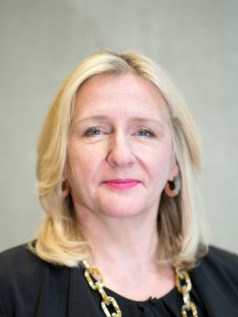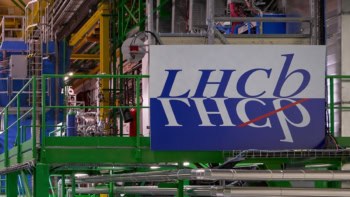Anne Crean, head of science and innovation at the Institute of Physics, talks to Matin Durrani about how it is supporting research and business innovation
What is your role at the Institute of Physics (IOP)?
I lead the IOP’s work to influence and deliver impact on science and innovation matters important to the physics community in the UK and Ireland. I have over 30 years executive and non-executive director experience working in business, government, membership and research and innovation organizations, including 8 years at the IOP.

What role does physics play in supporting the economy?
The physics sector in the UK accounts for 11% of GDP, 10% of UK employment and performs one-third of all business research and development. Physics-based products and services are critical to advances in aerospace, defence, energy, healthcare, manufacturing, transport and space sectors as well to the photonics, quantum and semiconductors industries.
Can you highlight any examples?
The IOP Business Award winners are perfect examples. Last year, Cerca Magnetics, Zilico, Digistain and Ceryx Medical received awards for their disruptive medical innovations. Also recognized were Porotech for the development of porous semiconductors that enabled the world’s first commercial indium-gallium-nitride red light-emitting diode (LED) epiwafer. Universal Quantum, meanwhile, bagged an award for its development work towards the world’s first million-qubit quantum computer as did Innovative Physics for the development of neutron detector technology deployed for decommissioning the stricken Fukushima Daiichi Nuclear Power Plant.
How can the IOP help the physics-based economy?
Physics is providing solutions to mitigate climate change and to tackle public-health challenges to help create a better world for the next generation. Without significant investment in R&D, infrastructure, skills and business innovation, however, the physics-based economy is at risk. It is vital that we evidence and champion the impact that physics has for policy makers and funders.
How does the IOP achieve this?
We have set out research and development blueprints to help create a thriving physics ecosystem. We are now organising community action on topical and pressing issues as well as creating a programme of impact projects to ensure the health of physics discovery and business innovation.
Could you explain what the impact projects are about?
The IOP’s impact projects involve community debates and evidence-gathering to influence science and technology strategies and investment. They also help to create roadmaps to address sector challenges or shape policy to tackle business innovation and growth issues.
What projects did the IOP deliver last year, and what concrete outcomes were obtained?
Working with IOP members and the wider physics community, last year our impact projects influenced national strategies for the quantum and semiconductor sectors. Our quantum work culminated in a report that coincided with the launch of a trade body for quantum businesses called UK Quantum and the UK National Quantum Technologies Programme’s Quantum Showcase. Members also formed a new IOP quantum Business Innovation and Growth network – qBIG group. It will support future roadmap activities, catalyse industry–academia collaborations and represent the quantum community to national and regional policymakers.
The second impact project in 2022 was run in partnership with the Royal Academy of Engineering and set out strategy recommendations around tooling and skills. It was linked to our work with the Compound Semiconductor Catapult on a roadmap for the development of so-called “type II superlattice” infrared detectors. The importance of innovation in physics
What impact projects are running this year?
Our flagship project for 2023 is “physics powering the green economy”, which will highlight the role that physics is playing in the green economy. The project will span energy production, transport, buildings and CO2 management applications. Through roadmaps in nuclear, renewables, energy storage, hydrogen and carbon capture, usage and storage it will recommend how to accelerate our transition to net zero. Work will also capture community thinking on recycling, adaptation, and the need for a fair and affordable transition.
We will also be exploring how future advances in positioning, navigation and timing technologies could drive economic growth. Finally, we will be working with venture capitalist firms that are investing in physics-based businesses to better understand their interests and issues. This will hopefully influence strategies to support future investment.
How can the community propose future impact projects?
We want our members and the community to help shape the debate and stimulate our next set of impact projects. We hope to encourage submissions from across academia, business, nations and regions, and from under-represented groups in our community. This is an opportunity for the whole physics community to say what matters most and why, what science and innovation issues are important, what change is needed, and how the IOP can make a difference.
- Submissions for IOP impact projects can be made here. The deadline is 11 May.




